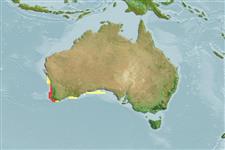Teleostei (teleosts) >
Syngnathiformes (Pipefishes and seahorses) >
Syngnathidae (Pipefishes and seahorses) > Syngnathinae
Etymology: Phyllopteryx: Greek, phyhllon = leaf + Greek, pteryx = wing, fin (Ref. 45335); dewysea: Named for Mary ‘Dewy’ Lowe, for her love of the sea and her support of seadragon conservation and research..
Environment: milieu / climate zone / depth range / distribution range
Ecology
Marine; reef-associated; depth range 50 - 72 m (Ref. 100032). Tropical
Distribution
Countries | FAO areas | Ecosystems | Occurrences | Point map | Introductions | Faunafri
Eastern Indian Ocean: Western Australia.
Size / Weight / Age
Maturity: Lm ? range ? - ? cm
Max length : 25.9 cm TL male/unsexed; (Ref. 100032)
Short description
Morphology | Morphometrics
This species is distinguished by its red colour, and pink vertical bars that extend halfway up the body to the lateral trunk ridges; it has 18 trunk segments; head crest without appendage; enlarged pectoral area; dorsally enlarged spine on trunk ring 11 that is pointed forward; a pair of enlarged ventral spines on rings 8 and 17; the body deepest on ring 12, behind dorsal spine; spines on lateral trunk ridge are not continuous with lateral tail ridges (Ref. 100032).
Occurs more offshore in slightly deeper waters; at 50+m with complex habitat of a mixed reef and sandy habitat with two paratypes collected from the continental shelf (Ref. 100032).
Life cycle and mating behavior
Maturity | Reproduction | Spawning | Eggs | Fecundity | Larvae
Stiller, J., N.G. Wilson and G.W. Rouse, 2015. A spectacular new species of seadragon (Syngnathidae). R. Soc. Open Sci. 2(140458.):1-12. (Ref. 100032)
IUCN Red List Status (Ref. 130435)
Threat to humans
Harmless
Human uses
More information
CountriesFAO areasEcosystemsOccurrencesIntroductionsStocksEcologyDietFood itemsFood consumptionRation
Common namesSynonymsMetabolismPredatorsEcotoxicologyReproductionMaturitySpawningSpawning aggregationFecundityEggsEgg development
Age/SizeGrowthLength-weightLength-lengthLength-frequenciesMorphometricsMorphologyLarvaeLarval dynamicsRecruitmentAbundanceBRUVS
ReferencesAquacultureAquaculture profileStrainsGeneticsElectrophoresesHeritabilityDiseasesProcessingNutrientsMass conversion
Tools
Special reports
Download XML
Internet sources
Estimates based on models
Phylogenetic diversity index (Ref.
82804): PD
50 = 0.7500 [Uniqueness, from 0.5 = low to 2.0 = high].
Bayesian length-weight: a=0.00447 (0.00177 - 0.01127), b=3.00 (2.78 - 3.22), in cm total length, based on LWR estimates for this (Sub)family-body shape (Ref.
93245).
Trophic level (Ref.
69278): 3.4 ±0.4 se; based on size and trophs of closest relatives
Resilience (Ref.
120179): High, minimum population doubling time less than 15 months (Preliminary K or Fecundity.).
Fishing Vulnerability (Ref.
59153): Low vulnerability (16 of 100).
